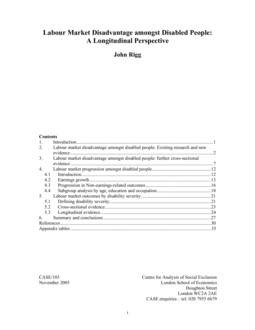Recognized names mentioned in this document
Overton only tracks names from certain institutions. Names must have been cited in at least one policy document and their corresponding affiliation has to be found nearby - you can find more details on the help page.
Julian Le Grand
at London School of Economics and Political Science
Anne Power
at London School of Economics and Political Science
Carol Propper
at London School of Economics and Political Science
Howard Glennerster
at London School of Economics and Political Science
John Hills
at London School of Economics and Political Science
Kathleen Kiernan
at London School of Economics and Political Science

